Amendment in GST Registration: Step by Step Guide
- 23 May 25
- 13 mins
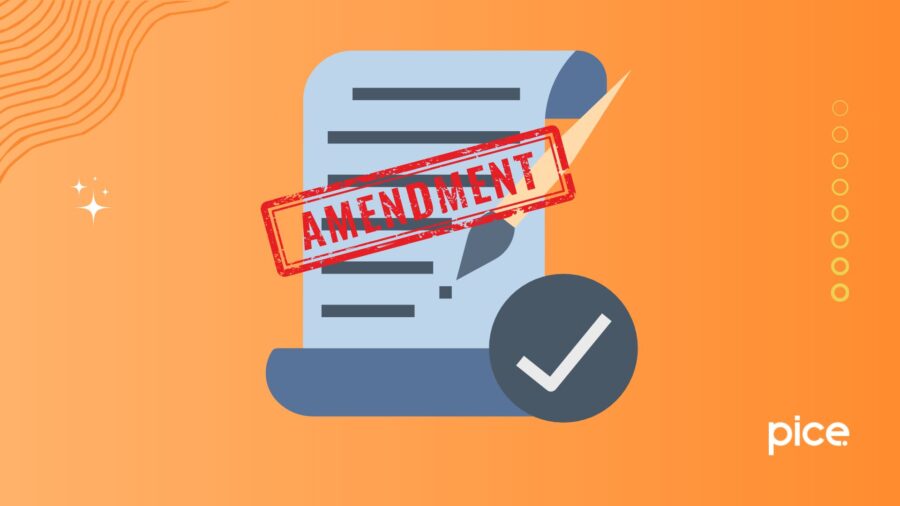
Amendment in GST Registration: Step by Step Guide
- GST Registration Meaning
- Amendment of GST registration
- Types of GST Registration Amendments
- In Case of Amendments to Core Fields
- In Case of Amendments to Non-core Fields
- Official Approval is Not Required
- Updating the Email Address or Phone Number
- Eligibility Criteria for Amendment of GST Registration
- GST Amendment: Changes to Business Name
- GST Amendment – Changes to Address
- GST Amendment – Changes to Promoter Information
- GST Amendment – Changes to the Mobile Number/Email ID
- GST Amendment – Changes to PAN
- Limitations in GST Registration Amendments
- GST Amendment Time Limit
- GST Registration Amendment Procedure
- Review and Approval (For Core Field Amendments)
- Conclusion
Key Takeaways
- GST amendment enables businesses to update their registration details to maintain accuracy and compliance with tax regulations.
- Changes to core fields (like legal name or business address) require GST officer approval, while non-core fields can be updated instantly online.
- Amendments must be filed within 15 days of the change, and officers have another 15 days for review or approval.
- GST REG-14 is used for amendment requests, and if not acted upon by the officer in time, changes are applied automatically.
- Timely amendments prevent penalties, ensure regulatory alignment, and support smooth business operations under GST law.
The phrase "GST amendment" refers to the process in which changes/updates are made to the details entered by the individual when they initially registered for GST. Upon registering for GST, circumstances may arise later that may call for an update of the provided information.
This leads to the case of a "GST Amendment." The alterations may include changes in the account for business information, communication details, and other prompted specifications.
GST amendments are crucial as they are the medium through which the information provided to the tax authorities always stays relevant, updated, and accurate. They reflect any changes made to the structure or business operations' mode. Businesses are able to keep up with GST compliance by always keeping the GST registration details current. This also helps avoid possible penalty accumulation.
This blog shall dive deeper into the nitty-gritty of making amendments to GST registration and associated information.
GST Registration Meaning
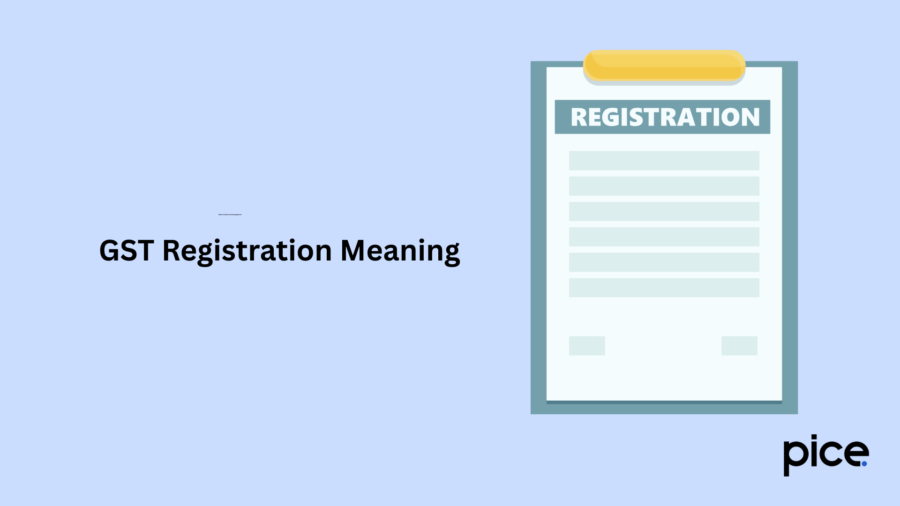
As per the Goods and Services Tax (GST) regime framework, GST registration is a crucial process that businesses and individuals must undertake. They must register with the respective tax authorities if their eligible turnover exceeds the threshold limits established by the government.
Post registration completion, the businesses/individuals are communicated a unique Goods and Services Tax Identification Number (GSTIN). This unique number is then used for the successful filing of GST returns, obliging by tax-related tasks, and for compliance with the GST rules and regulations.
Amendment of GST registration
When the information provided during the initial GST registration process is modified or updated, it is referred to as an amendment of GST registration. This lets registered persons/entities update their unique registration information as and when required by making alterations to the particulars. This includes the following:
● Authorized signatories
● Business address
● Contact details
● Business details and activities, among other relevant informational bits.
Types of GST Registration Amendments
Amendments to GST registration details can be divided into three primary categories. Each section is defined by a required level of authorisation and a timeline within which the modifications shall be implemented.
Further, to request amendments to specific registration application sections, it's compulsory to justify the need for such changes. This need is part of the GST registration protocol.
In Case of Amendments to Core Fields
Changes within this category have to do with critical details, including the following:
● Legal name of the business
● Main business location
● Secondary business locations, etc.
Amendments to such core fields shall require prior approval that has to come from the relevant governing body. This may typically take about 15 days. Such modifications are specifically integral to the concerned business's GST registration identity in general.
Core Field Details Include:
● The legal name of the business that provides the PAN, shall remain unchanged.
● The main and secondary business locations, given that there is no change of the state initiated.
● Changes that involve major stakeholders like partners, promoters, the managing committee, Karta, or even the CEO
● Verification & Approval
Amendments to these core fields require verification/approval by an authorised tax official, as these fields deal with the fundamental aspects relating to the business identity/their legal bearing. This could even affect compliance and tax liability on their end.
In Case of Amendments to Non-core Fields

The non-core field amendments category includes all the other registration details. These changes do not require approval from a specific regulatory body. Alterations to such non-core fields shall be made online, directly facilitating a quick update procedure. This section covers all the information beyond the scope of core fields. Businesses are free to modify these fields as per convenience:
● Updating bank account information
● Adjusting business-related information
● Updating the goods/services lists offered
● Modifying the state-specific information without changing the state name
● Changing authorized representatives/signatories
● Updating information about the existing stakeholders, including partners/promoters/Karta
● Adjusting the current main/secondary business locations minutely
Official Approval is Not Required
Amendments within the non-core fields require no approval from the tax authorities. A registered taxpayer shall make the relevant alterations by directly accessing the GST portal. Further, they are automatically processed.
Here is a table outlining the differences between core and non-core fields for your clearer understanding:
| Core fields (Approval Required) | Non-Core fields (No Approval Required) |
| Name of the Business (Legal Name) if there is no change in PAN | All the other fields of the registration application except the following: |
| Addition / Deletion of Stakeholders | The Legal name of the business |
| Principal Place of Business (other than a change in State) | Addition/ deletion of stakeholder details |
| Additional Place of Business (other than a change in State) | Principal place of business and another place of business. |
Updating the Email Address or Phone Number
A specific procedure must be followed to update an email ID or contact number that has initially been linked with the GST account. Start with an online verification process via the universally accessible GST portal.
The step can be completed by providing an OTP or One-Time Password for verification to ensure that the relevant contact information is accurate and secure. This helps maintain the integrity of the input GST registration details.
Eligibility Criteria for Amendment of GST Registration
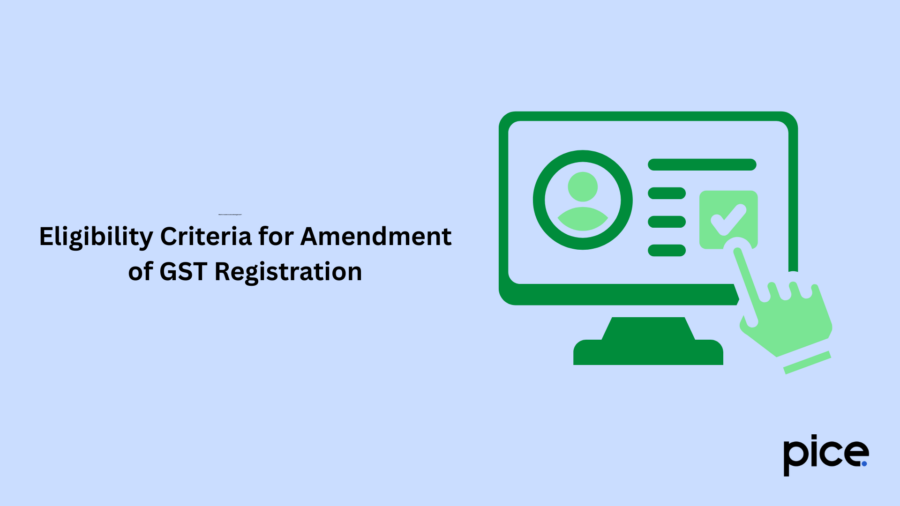
Amendment of GST registration can be initiated by a registered taxpayer who falls under any of the following categories:
● Normal Taxpayers
● New Registrants
● Non-Resident Taxable Person
● TDS/ TCS Registrants
● Embasses
● UN Bodies
● Notified persons possessing UIN
● Online Details and Database Access/Retrieval Service Provider
● GST Practitioner
GST Amendment: Changes to Business Name
If the GST name previously provided needs to be changed due to an update in the legal business name, the GST registration certificate shall remain valid and not be cancelled. The GST name simply has to be changed, and this can be done by altering the GST registration to reflect the new name of the business.
● The FORM GST REG-14 has to be submitted on the GST portal in 15 days to initiate the amendment process, following up with the event of the change of the business name.
● The form will then be submitted. After that, the GST Officer will review the application. If a degree of satisfaction is reached, the amendment to the new business name will be approved. This will be done within 15 working days with Form GST REG-15.
● After approval, this amendment will take effect on the date the need for change emerged.
GST Amendment – Changes to Address
To change the address associated with the principal place of business/any other area of business, the GST FORM REG-14 has to be filed. For example, proof of address for the new location will require changes to the pre-provided address. It must be updated in the amendment application for the GST registration.
GST Amendment – Changes to Promoter Information
An application for amendment must be filed within 15 days of the addition/deletion/retirement of the respective Karta/partners/directors/Chief Executive/Managing Committee/Board of Trustees/Officer/equivalent responsible for the daily affairs of a business.
Once the application for amendment is submitted, the officer must approve the change/request for additional details within 15 days of its successful submission.
GST Amendment – Changes to the Mobile Number/Email ID
The assigned Authorized Signatory must make any alterations to the mobile number/email ID as previously provided on the GST Common Portal. They have to use their digital signature following an online verification process.
The amendment made to a mobile phone number/email ID does not need the filing of a GST amendment application or a verification by any Officer. The changes made to the GST common portal are considered routine alterations.
GST Amendment – Changes to PAN
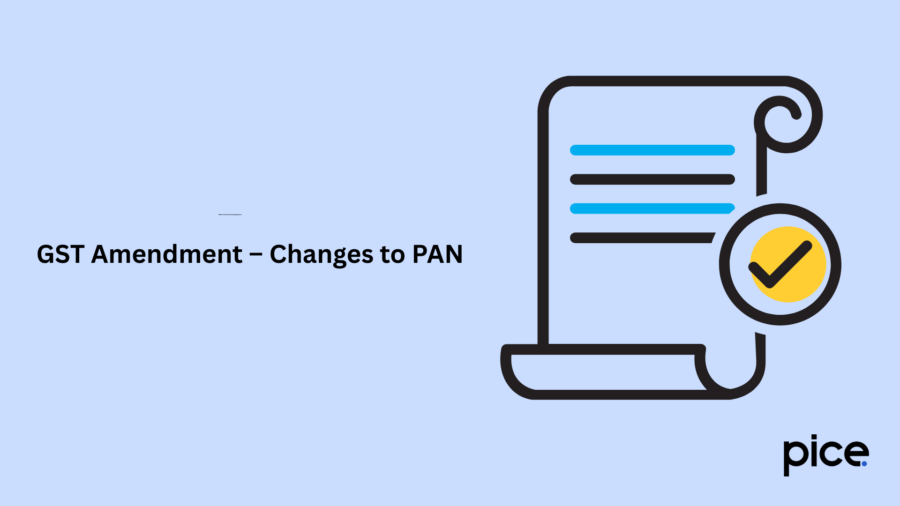
If there is a change in the business or the PAN constitution, an amendment application for GST cannot be requested. However, a fresh GST registration application in the form GST REG-01 can be submitted to apply the changes to PAN.
Limitations in GST Registration Amendments
Here are the details that cannot be altered in the GST registration process:
● PAN Card details
● Moving Between the States
● Change of Business Type
● Updating timary Authorised Signatory
GST Amendment Time Limit
The GST Amendment timeline and limit are discussed below, with the main focus on the important deadlines as well as steps involved in the procedure:
- Notification Deadline
Taxpayers are required to be informed of alterations to their GST information via the common portal within the 15 days that follow the event which necessitates said change. This is done through an application for amendment.
- Officer Approval
The authorised officer is responsible for verifying as well as approving the application for GST amendment within the 15 working days, following its receipt. The approval allows the amendment process to become effective from the date on which the event leading to the change was initiated.
- Notice for Additional Information
In certain circumstances, the amendment application may be deemed unjustified. Alternatively, the relevant document's upload status may be incomplete or incorrectly conducted. In such a case, the officer will have to issue a notice to the taxpayer, who must provide any additional information/clarification within the upcoming 15 days.
Upon receiving the notice, the registered taxpayer will have 7 days to submit the necessary clarification and other details.
- Approval or Rejection
If the taxpayer is able to provide a satisfactory answer, the officer shall approve the application for GST amendment.
On the other hand, the officer shall reject the application in case the taxpayer's response to the notice is insufficient/dissatisfactory.
- Automatic Amendment
If the officer does not act within the allotted 15-day time frame, after receiving the amendment application or within the 7 working days of getting the additional information/clarification. In such a case, the registration certificate shall be automatically amended as per the request made.
The new, amended certificate shall be available for viewing on the GST Portal.
GST Registration Amendment Procedure
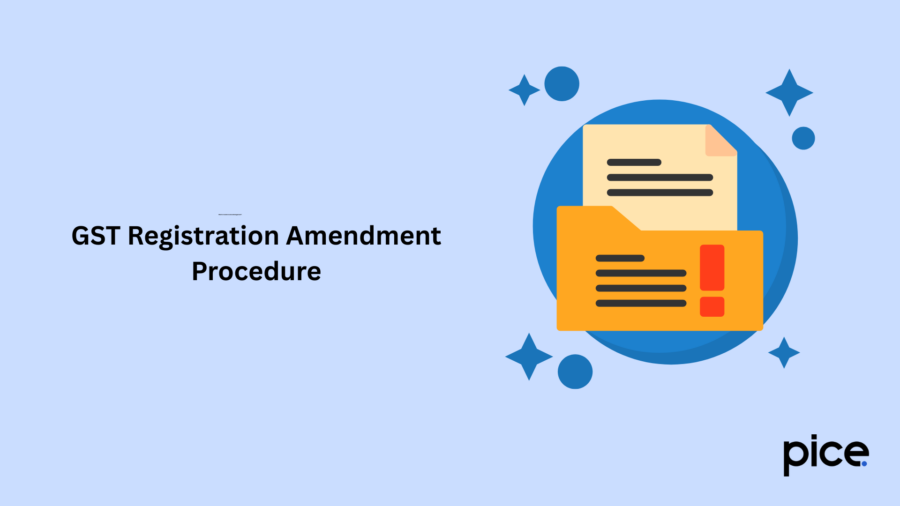
To amend the GST registration, a fresh application has to be filed on the GST Common Portal:
Step 1: Application Filing
A fresh registration amendment application has to be filed on the GST Common Portal. Specify whether the amendment shall be made for a core or a non-core field.
Step 2: Selecting the Amendment Type
● Core Amendments: Settle the particular core field you must amend. This may include the promoter's and partners' related details, business-related information or principal/additional places of business.
● Non-core Amendments: Choose the relevant non-core field you need to change.
● Editing/Document Upload: Make necessary changes to the details within the chosen field.
Upload the supporting documents, such as address proof for alterations to the principal place of business, ID proof for changes in partner or promoter-related information, or any other prompted document.
Step 3: Submission and Verification
After making the necessary changes, providing the reasons for the amendment, and mentioning the date, you may 'Save and Continue'.
Make sure to cross-check the amendment application using DSC/e-signature/EVC, which will generate the ARN (Application Reference Number). The acknowledgement will be communicated to the registered contact information.
Review and Approval (For Core Field Amendments)
As tax officer approval is required, they shall review the core field application for GST amendment. Upon its approval, the taxpayer shall receive the approval order and an updated certificate of registration. In case the application is rejected, the registered contact details will receive a notification informing of the corresponding status.
Automatic Update (For Non-Core Field Amendments):
As the amendments for non-core fields are automatically updated upon their submission, they do not require the tax officer’s approval. Such alterations are effective, starting from the date of the event which prompted the amendment.
Conclusion
The amendments in GST registration procedures are essential in ensuring the accuracy and validity of taxpayer-related details. Through this amendment process, taxpayers can modify their registration details, including business activities, names, constitutions, and addresses, so the updated details accurately reflect the changes in their business-related operations. It shall allow the consistent maintenance of the integrity of the GST system and serve as a shield against potential misuse.
By updating registration details in a timely manner, taxpayers can successfully avoid fines, penalties, and other consequences. They can also stay on par with the GST compliance requirements, allowing for seamless business operations.
💡If you want to streamline your invoices and make payments via credit or debit card or UPI, consider using the PICE App. Explore the PICE App today and take your business to new heights
 By
By 
















